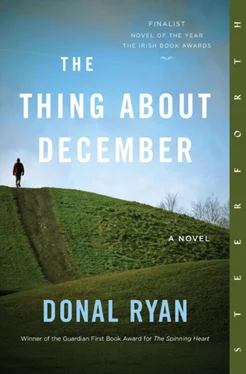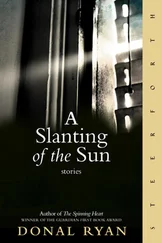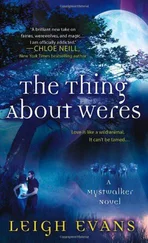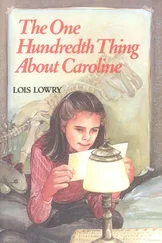But you know if another man stood where you’re standing and looked at the same things he wouldn’t see it or feel it. He’d see that the fields are only wet with dew and the walls only running because the vents are blocked with dirt and grime and it’s Virginia creeper climbing the house that people used to stop to admire for its lovely, fiery colours on their passage up the yard towards the front door. So it only exists in your head. It only occupies a tiny space. Is it even an inch squared? Probably not. How big is a feeling? Not even as big as one of them atoms that the science teacher used to be on about. It’s nothing and everything at the same time.
The world doesn’t change, nor any thing in it, when someone dies. The mountains keep their still strength, the sun its heat, the rain its wetness. Blackbirds still hop and flutter about the back lawn, fighting over worms. The cat still screeches and paws at the back window for her grub. Bees still dance about the flowers and the apple trees, always searching, searching. There’s an awful cruelty in the business of nature, in the brutal sameness of things. The sky was the same blue the day after Daddy died as it was the day before; the uncaring rain didn’t stop while they buried Mother, only bucketed ignorantly down and ran in muddy rivers from the Height to the road below.
EUGENE PENROSE and the dole boys relented for a while. If they were at the pump or the memorial of an evening, they left him walk past unhindered. But he knew they’d soon tire of their nod to common decency and resume slagging and ciffling and tormenting him. Even Packie was tolerably nice to him for a few weeks. The Unthanks gave him a fine lunch every day in the bakery, and a few times Herself bent down and kissed him on top of his head while he was eating. Whenever she did, he felt like crying again. She gave him his dinner every day as well in her own kitchen for the first while, then after a week or so, when he was back working in the co-op, she gave him a plate of something every evening, wrapped in tinfoil to carry home and heat up in the microwave.
Mother had nearly never used the microwave. It was a present from one of the aunties. Mother said the old witch was too scared to use it and so dumped it on her. She said it could give you any kind of disease, how would you know? She said some lady had stood in front of one while it was working and it fried her liver and she died in screaming agony. The first time Johnsey turned it on by himself, carefully following the instructions Himself had written on an envelope for him, he stood well clear. When it pinged to tell him it was finished, he nearly jumped out of his skin. Himself said if a microwave had fried someone’s liver, it was years and years ago, when they were invented first and no seals were put on them. Now, the microwaves could not escape. Johnsey wasn’t fully convinced. He always opened and shut the door fierce fast. He didn’t want runaway microwaves flying about the place and frying bits of him.
The Unthanks had suggested he come down and stay with them. He couldn’t. It would be just too embarrassing. Among other mortifications, he would have to use their toilet. Imagine the two lovely gentle people trying to pretend they didn’t notice the terrible stink from the great ape they had invited into their home! It wouldn’t be fair on them. Probably, if he stayed there any length, he wouldn’t use the toilet at all. Like the time Daddy’s cousin from New Jersey in America and his scary blonde wife and their wild children had come to stay in the house when Johnsey was twelve. They were touring Europe , thank you very much (the cut of them, Mother said, that fella hadn’t a seat in his pants growing up and he going around now touring Europe for himself! I ask you. How’s it he wasn’t staying inside in town in the new hotel so, besides issuing himself an invitation to land his whole family on top of them if he was so swanky?), and they stayed a week and a bit and he never shat the whole time and was doubled up in agony for a finish. When they were safely gone and he finally went, his hole nearly burst open with the concrete block he had to force out through it.
Or, he could run up home. He still couldn’t imagine, though, being a guest in someone’s house, even the Unthanks who he had known and loved dearly since childhood. He would be a big, smelly, sweaty nuisance and they would hate the sight of him and want him to leave. Johnsey didn’t even know how they made themselves be so nice to him during his daily lunch.
JOHNSEY HAD GOTTEN used to being sad after Daddy died. This extra sadness was just like taking more weight forking hay: you built it up gradually so that when your burden increased, your muscles were ready and you would not collapse under it. Mother had spent two and a bit years wrapped in a cloak of sadness, hardly talking and, he saw now, only waiting around until her time came to join Daddy. How could she have just upped and left him like that? Granted, he was no great prize of a chap; he had never given her any reason to be below in the Post Office boasting about him like some women who would talk out loud in the queue for fear anyone would not accidentally overhear about their sons who were doing Masterses, or just finishing their accountancy exams, or were abroad in Australia for a year, sure didn’t he deserve a bit of fun after studying so hard for years, blah de blah de blah.
But he was surprised at Mother all the same. She had sure left him in the lurch. It felt like she had planned this behind his back, to go and meet Daddy and leave him on his own. Like all those muttered prayers were her talking to him under her breath all along, arranging her departure. Was he not even worth staying on this earth for? He felt a bit annoyed with Daddy too, truth be told. It was like he was in on it, somehow. Were the two of them watching over him at least, like Father Cotter told him? Sometimes he wished he could see their ghosts, but then he’d probably run away screaming if it actually happened. Or roar shouting at them for leaving him behind.
That was something else about being totally alone that Johnsey knew he would not be able to stand for very long more: the feeling that he was not alone. The house creaked and moaned at night, as it always did, but before he used to always hear Mother’s breathing and sighs from down the hallway as well. The only feeling of real comfort he had in the two and a bit years of Mother living and Daddy dead were on nights when he was in bed before her and she was foostering about downstairs and praying (or talking to Daddy?) under her breath: the old house would carry her sounds down to his ear and he could drift away knowing she was at least there in body, and she might come round eventually and laugh again, or gossip, or give out at least. Now, every mouse-squeak became boot leather chafing against itself as someone crept along the hall towards his room; every clink or clunk or faint tinkle became an enemy arming himself, or a demon preparing to suck his life out through his mouth and carry away his soul to hell. These thoughts often became thoughts about the crossbeam in the slatted house and the rope on the hook in the back kitchen. How big of a sin could it really be to want to be with your mother and father in heaven? Why would God want him to persevere with this empty misery? Father Cotter says He has a plan for us all. Thanks, God, for the great plan.
UP IN THE MORNING, cereal and toast, down to the village to work, lunch in the bakery, home past Eugene Penrose and his monkeys who were starting to settle back nicely into their old ways now, heat up dinner, television, into bed. Long nights trying to push black thoughts from his mind so he may sleep. Weekends were worse. He used to love them. He and Daddy would be out doing jobs all day Saturday; they’d go to a match most Sundays in summer and maybe go to the cinema in winter, or watch a film at home, or a soccer match on the television. The fire would always be roaring. Mother would always do a great spread on Sundays and she’d have baked on Saturday so there would be an array of desserts. Now Saturday was a day of sleeping until the middle of the day, waking up from savage dreams to a cold, dead house, trying to sort out laundry, going to the village for a burger and chips and hoping there’d be a dirty film on Channel 4 that night. Sunday was a day of going to early Mass and sitting there thinking blasphemous thoughts about God and his quare plans, eating his dinner with the Unthanks and feeling guiltier each time over abusing their hospitality by imposing his big, lummoxing self on their cosy Sabbath. And any evening, with no warning, Aunty Theresa might drag in with mousy Nonie and Theresa’s cross, bored husband Frank to tell him he’d have to start making plans and sort the house out and would they go up now and go through Sarah’s things and he would have to stutter and mumble his way into putting them off because if you let crows pick at your dead dog’s eyes you could no longer tell yourself he was only asleep.
Читать дальше











